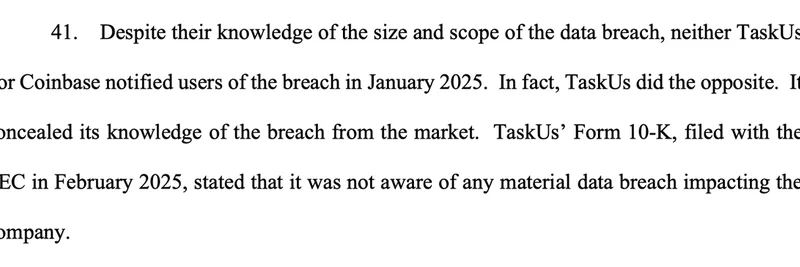Ever feel like the crypto world is one big game of trust me, bro? Well, a recent thread on X (formerly Twitter) by user @tayvano_ just dropped a bombshell that's got everyone questioning just how safe their data really is on major exchanges like Coinbase. We're talking about a data breach that hit in early 2025, involving an outsourcing firm called TaskUs, and it wasn't just sloppy security—it looks like a deliberate cover-up that left thousands of users in the dark.
Let's break it down step by step, because this isn't your run-of-the-mill phishing scam. This is about personally identifiable information (PII)—think names, addresses, Social Security numbers, bank details, even photos of government IDs—getting swiped and sold off like hotcakes. And the kicker? The companies involved knew about it for months but played it cool, even lying to regulators.
The Breach That Slipped Through the Cracks
It all started back in September 2024, when shady operators began bribing TaskUs employees in their Indore, India facility. These insiders were
- Next, let's think about how to frame this for Meme Insider's audience.
paid up to $200 a pop to snap photos of sensitive customer docs and hand them over. By January 1, 2025, TaskUs discovered the full extent of the mess: a sprawling "hub-and-spoke" operation where rogue staffers funneled data to criminals, raking in over half a million dollars in bribes. The fallout? An estimated $180 million to $400 million in stolen cryptocurrency assets.
Coinbase, which outsources customer support to TaskUs, confirmed around 70,000 users—about 1% of their 9.7 million monthly actives—were impacted. But here's where it gets shady: despite spotting the breach in January, neither company breathed a word to affected users until May 14, 2025. That's four months of radio silence while hackers had free rein with people's private info.
The SEC Lie That Sealed the Deal
If delayed notifications weren't bad enough, enter the big red flag: TaskUs's February 2025 Form 10-K filing with the U.S. Securities and Exchange Commission (SEC). In black and white, they claimed, "We were not aware of any material data breach impacting the company." Yeah, right. By then, they had fired 300 employees tied to the fraud and even axed their entire HR investigation team to bury the evidence deeper.
As @tayvano_ points out in the thread, this wasn't oversight—it was obstruction. Just days before Coinbase finally spilled the beans publicly, TaskUs got bought out and went private, dodging further scrutiny without updating investors on the ticking time bomb.
Why This Hits Hard for Meme Token Traders
Look, if you're knee-deep in meme coins like $DOGE or $PEPE, you're probably riding the hype waves on platforms like Coinbase. But this breach underscores a harsh reality: your wallet isn't just about seed phrases—it's tied to real-world data that can lead straight to your doorstep. Exposed PII means risks like identity theft, targeted scams, or worse, physical threats if criminals get creative.
The thread calls out the FTC's role too—they knew TaskUs had systemic issues but apparently couldn't force a fix. And with Coinbase still potentially leaning on TaskUs India (as @tayvano_ cheekily asks), are we looking at round two?
What You Can Do to Protect Yourself
In the wild west of blockchain, knowledge is your best armor. Here's the quick playbook:
- Monitor Your Accounts: Use tools like Have I Been Pwned to check if your email's in any leaks.
- Layer Up Security: Enable 2FA everywhere, but go beyond—hardware wallets like Ledger or Trezor keep your meme gains offline.
- Demand Transparency: Hit up exchanges on X or their support lines. If Coinbase's still cozy with TaskUs, make your voice heard.
- Stay Informed: Follow threads like this one for the unfiltered truth—because by the time it's on the front page, the damage is done.
This scandal isn't just a blip; it's a wake-up call for the entire crypto ecosystem. As meme tokens push boundaries with viral pumps and community-driven vibes, securing the basics like data privacy is non-negotiable. What's your take—time to ditch centralized exchanges for DeFi? Drop your thoughts in the comments.
For the full legal dirt, check out the amended complaint that's fueling this fire.




